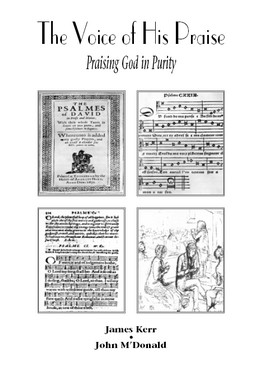The Voice of His Praise
by Rev. James Kerr and Rev. John M'Donald
More information about purchasing our publications can be found here.
The Voice of His Praise
by Rev. James Kerr and Rev. John M'Donald
ISBN
0-9526799-5-7
36 pages; soft
cover
£1.50

Our "Psalmody Pack" – the books God's Hymnbook for the Christian Church, The Voice of His Praise, and A Catechism on Praise – can be purchased here.
Foreword
T HE James Begg Society has pleasure in making available once again the tracts contained in this booklet, wishing them a wide circulation among the churches and praying that the much-needed blessing of the Lord would rest upon their contents.
We agree with Scottish Presbyterian George Gillespie (1613-1648) who wrote in his important work "The English Popish Ceremonies": "that it is God's right to order the institutions of worship in His church exclusive of any innovations man might impose, through conceit, ignorance, or good intention." Yet sadly an unwelcome revolution is overtaking the evangelical church. In her worship she has loosed herself from scriptural moorings and is now adrift on a sea of change and who can predict where she will come to rest? Will Rome itself prove the final haven for those who begin their departure from the living God by a form of worship that pleases man rather than the Almighty? The full flood of mancentred praise that has brought such havoc in its wake in fact began with the trickle of hymn-singing and instrumental music into the house of God. Faithful pastors and people in the pew have been rendered powerless in the face of the current onslaught because they have sought to resist the trend on the wrong basis. The pleas for 'good' hymns and 'modest' accompaniment are ultimately subjective and must be left to the determination of each individual. There is, however, a real remedy as this booklet shows and as the authors demonstrate it is one which has the consensus of church history on its side as well as Scripture.
These four short tracts were first issued separately by the Tract Publication Committee of the Reformed Presbyterian Church of Scotland over one hundred years ago. The complete text is reproduced here as in the originals, except for some modifications to layout and punctuation, corrections to spelling and historical detail and the addition of Scripture references, biographical and other psalmody material.
Of the two authors, the Rev. James Kerr (1847-1905) was born in the parish of Kilraughts, Co. Antrim, Northern Ireland, where he was privileged to enjoy a godly upbringing. After the usual education he took an undergraduate course at Queen's College, Belfast, where he demonstrated an all-round competence in his subjects and from which he proceeded to the Theological Hall of the Reformed Presbyterian Church of Ireland. On completion of his studies he was licensed on 18th March 1868 and ordained and inducted to the Greenock congregation of the Reformed Presbyterian Church of Scotland on 3rd February 1869. After twelve years in Greenock he was installed in the Glasgow congregation where he laboured fruitfully for over twenty years until his death. Dr. Kerr distinguished himself as an able contender for the faith once delivered to the saints. At different times he served as editor of two magazines, The Advocate and The Witness, in which he raised a voice on behalf of the truth. He was a contributor to "Romanism and Ritualism in Great Britian and Ireland." No subject fired his feelings more than the threats he perceived in his own day to the pure, scriptural Psalmody which had held sway in Scotland since the Second Reformation. (Further details regarding the life of James Kerr are to be found in: "Memorial Volume to the Rev. James Kerr, D.D." by the Rev. A. Holmes.)
The second author, the Rev. John M'Donald (1843-1933) was also a minister of the Reformed Presbyterian Church of Scotland in the congregations of Loanhead near Edinburgh and Airdrie near Glasgow. He was a member of the Scottish Reformation Society and published several works, including "Jehovah Nissi: The Lord My Banner" and "Romanism Analysed in the Light of Scripture, Reason and History," a catechism on the subject. He was among the editorial staff of The Psalm-Singer, a magazine begun in 1885 and edited by E.F. Bradley of Troy, New York State.
The breadth of sources that our two authors quote from is indeed impressive, amply demonstrating the consensus which once prevailed in the church regarding the worship of God. It is quite true that not all of those quoted by the authors to establish their case believed and practised exclusive, unaccompanied psalmody. It is also true that some of those cited would not be safe guides in other matters of theology; nonetheless the points which they make are valid and most instructive in the context of the arguments being advanced.
May it please the Lord to hasten the day when His people shall again be united in their worship of His great and glorious Name.
Acknowledgements
The Society is particularly grateful to one of its members, Mr. Michael Marzan-Esher of London, for his considerable labours with respect to the material contained in this booklet. Also we wish to thank the ministers of the gospel who kindly agreed to provide a recommendation of the contents. Indeed we are grateful to all who have helped in the production of this booklet.
— The Publishers.






